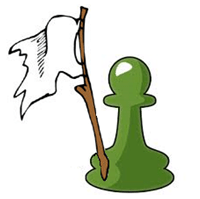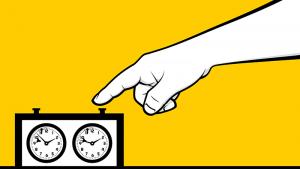
Never Resign Prematurely!
Throughout my chess career, I have resigned in several different ways. During my very first games with my brother, I - well, I resigned by knocking the pieces over in disgust. In my first tournaments, I flicked the king over, old style. Then, for another few years, I stopped the clock before extending my hand. Now, I do the reverse - shake hands, sign the scoresheet, and only then stop the clock. Throughout this veritable evolution, one thing has remained constant: I have never enjoyed resigning!
Some players are under the impression that grandmasters sense the "right" moment when they should throw in the towel. This is nothing but a misconception. It is certainly your right to play on as long as you wish, although its invocation can be unethical.
In some cases, the opposite takes place: a player is so disgusted with the course of the game and so confident in his opponent's strength that he surrenders before exhausting all of the defensive resources in the position. Even at the very top level, grandmasters have resigned in drawn (or even winning) positions. In this article, I would like to present several instances of premature resignations and try to understand the reasons for their unfounded pessimism.
We will start with a particularly memorable example. Keep in mind that at the time this game was played, GM Jan Timman was one of the strongest players in the world.
The moral of the story, in my opinion, is twofold:
- Pawn endings are very, very tricky. Quite frequently, a connected passer - even on the sixth rank - is not decisive. Even in a pawn endgame that appears totally hopeless, you might still be able to construct an improbable fortress or attain miraculous counterplay. Do not hurry to resign!
- Never resign before an ostensibly forced sequence. Humans are inherently fallible, so there is always a possibility that your calculation is flawed. Therefore, even if your opponent appears to be winning by force, you should play out the sequence or combination in its entirety before resigning. Who knows, maybe you will find an extraordinary defensive resource that your opponent failed to foresee!

The next game, played between the fabled Deep Blue Computer and Garry Kasparov during their second match 1997 (Deep Blue prevailed with a crushing 19-move victory in the final game), features another "tactical resignation." Understandably convinced that the silicon fiend had everything worked out, Garry capitulated...
Even Titans are not immune! Once again, Kasparov's reluctance to test his inhuman opponent is forgivable, but a timely application of the "never resign before a forced sequence" might have changed the result of the match.
Resignation on impulse is a second relatively common type of premature surrender. It is always difficult to keep a cool head after a tactical blunder, and it is therefore easy to misevaluate the position and overlook defensive resources. In the following game, a strong IM let pure shock dictate his actions.
To be sure, Black would have still won in nine cases out of ten, but far, far more hopeless positions have been turned around against stronger opponents.
Finally, take a crack at the following (relatively famous) position. Carlos Torre (1904-1978) was a tremendous chess player, but in this simul game against New York club player Frank Parker, he was steadily outplayed and threw in the towel a few moves before checkmate - or so it would seem.
Hopefully, you found this article both instructional and light-hearted. As my first coach often told me, "you cannot un-resign!"
RELATED STUDY MATERIAL
- Check out GM Daniel Naroditsky's previous article: How to Avoid Blunders, Part I;
- Never resign! With Daniel Rensch's Live Sessions; A "Guaranteed" Loss???;
- Like the Little Blue Engine, think you can in Chess Mentor;
- Sharpen your tactical edge in Tactics Trainer;
- Looking for articles with deeper analysis? Try our magazine: The Master's Bulletin.






